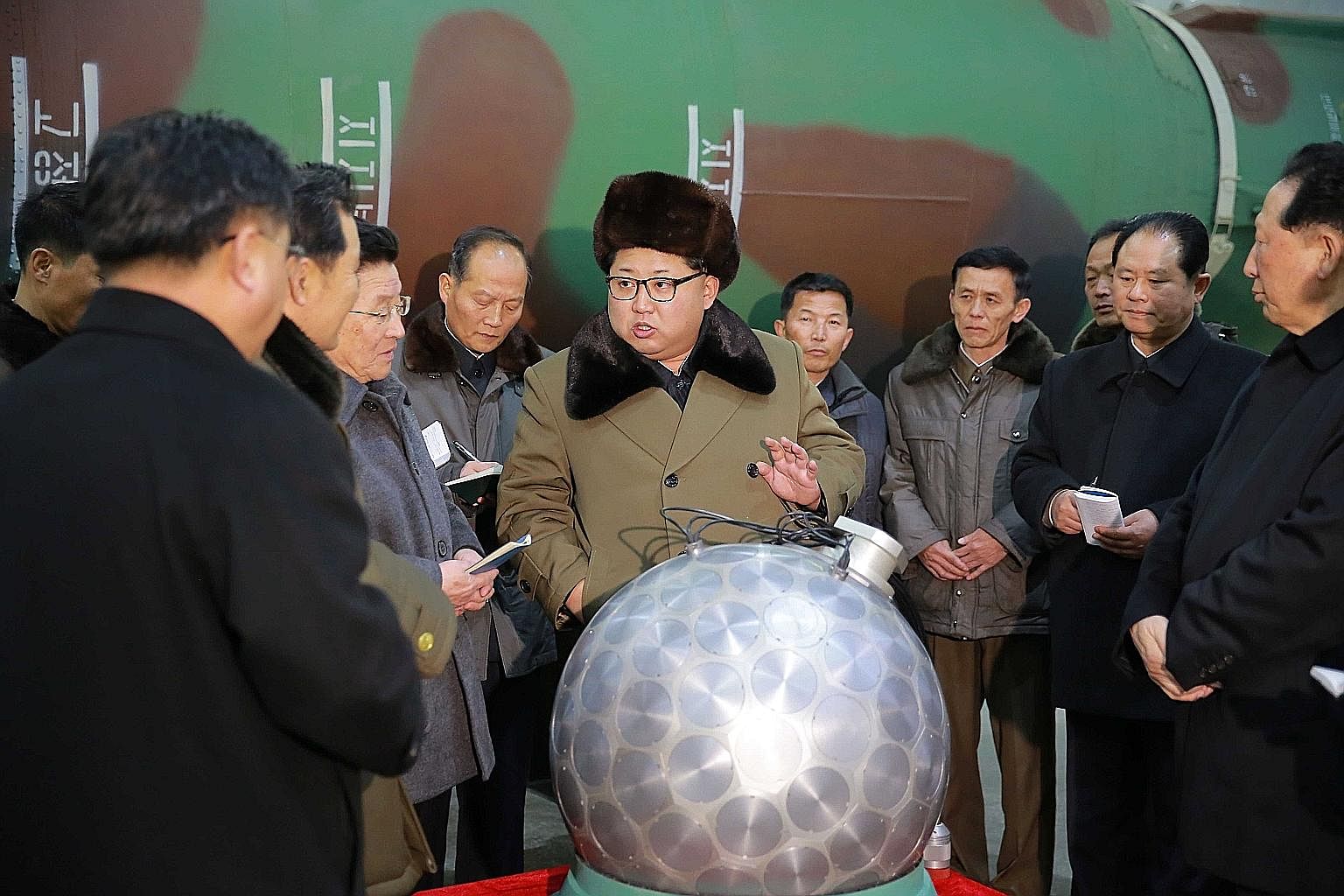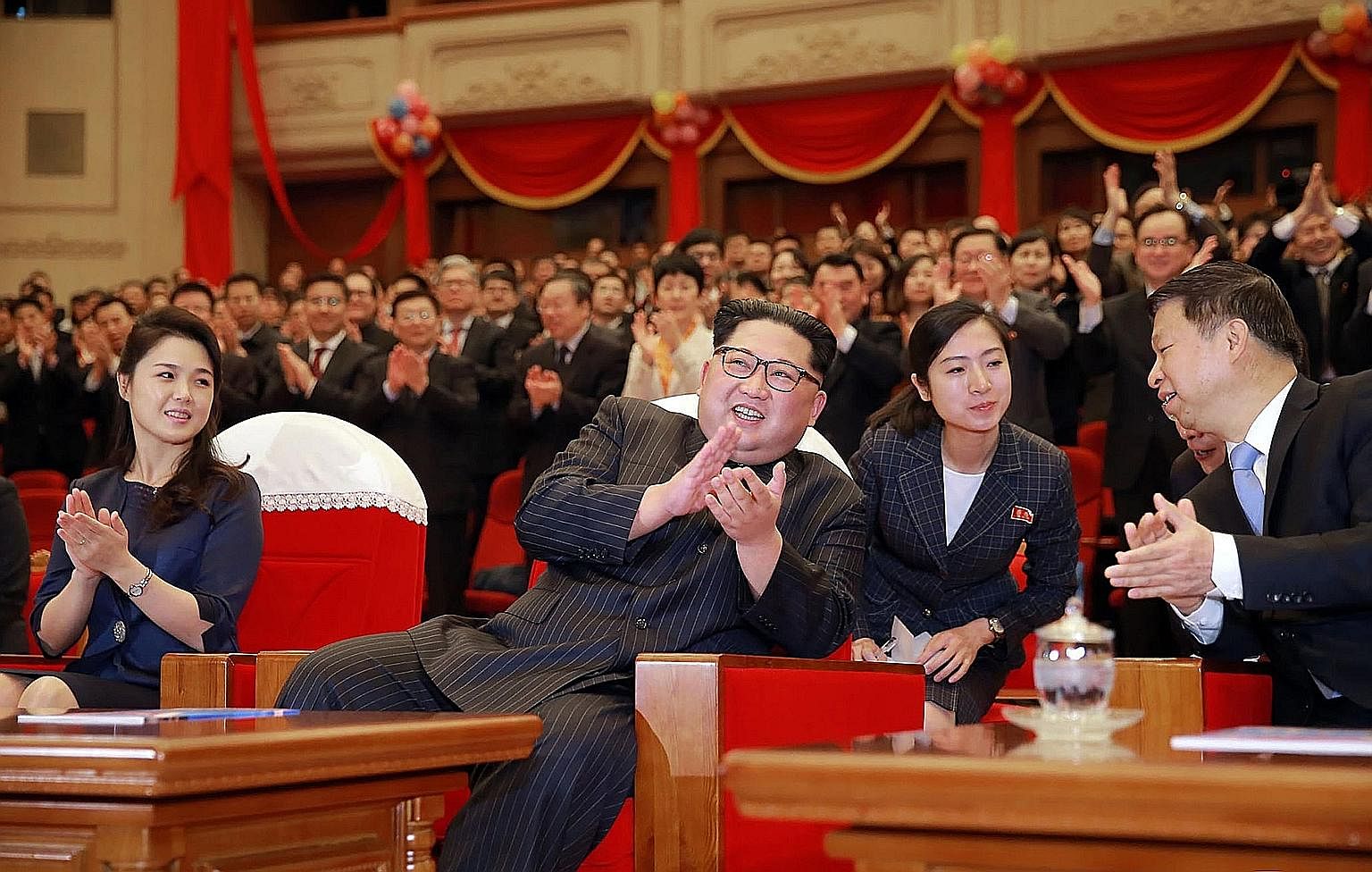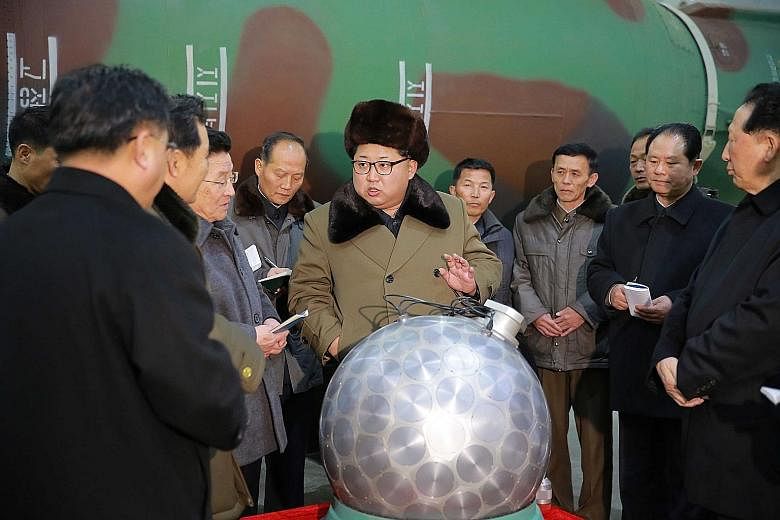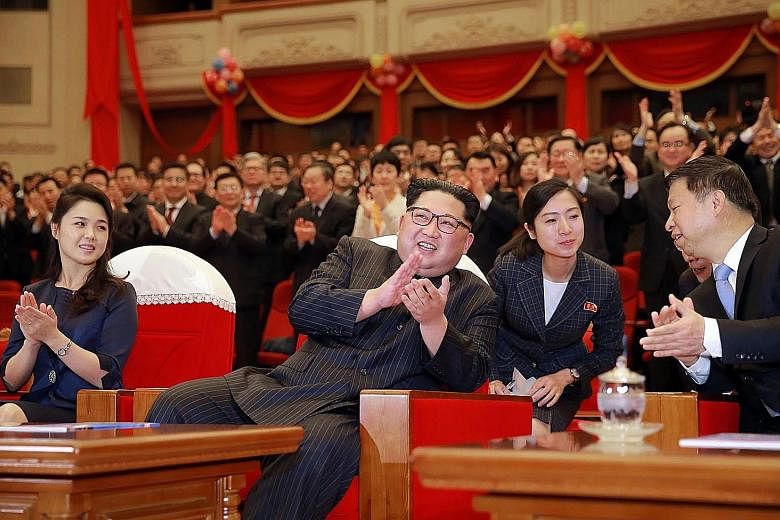SEOUL • For as long as Mr Kim Jong Un has been North Korea's leader, he has called for the simultaneous pursuit of nuclear weapons and economic growth with the aim of making the nation a "great socialist nuclear power".
But on Saturday, Mr Kim said that he was retiring his signature policy, known as byungjin, or "parallel advance". It has been at the centre of his government's propaganda and is enshrined in the charter of the governing Workers' Party. But Mr Kim said it is now time to adopt a "new strategic line" and focus the nation's resources on rebuilding its economy.
As for nuclear weapons, he said North Korea no longer needed to test long-range missiles or atomic bombs and would close its only known nuclear test site.
Mr Kim's pivot away from nuclear testing and towards the economy came just days before a scheduled meeting with South Korean President Moon Jae In and weeks before his planned summit with US President Donald Trump.
Despite lingering doubts about his nation's ability to strike the continental United States with a nuclear weapon, Mr Kim appeared to be making clear he intends to enter negotiations with Washington the way the Soviets did decades ago, as an established nuclear power. The big question is whether he will relinquish his nuclear weapons.
South Korean policymakers argue that Mr Kim is signalling a willingness to dismantle his nuclear arsenal for the right incentives, including economic aid, a peace treaty and other security guarantees from the US - needed to rebuild the North's economy.
"He is seeking the kind of rapid economic growth seen in China," said South Korea's former unification minister Lee Jong Seok.
But North Korea has long said that its nuclear weapons are not bargaining chips, and Mr Kim himself has called them "a powerful deterrent firmly safeguarding" his people's "rights to existence".


Mr Lee Sung Yoon, a Korea expert at the Fletcher School of Law and Diplomacy at Tufts University, called Mr Kim's decision a replay of an old North Korean tactic - trying to confuse enemies with dramatic gestures in an attempt to win concessions, without ever intending to give up nuclear weapons.
American officials say they have been repeatedly cheated in previous talks on denuclearisation. A deal in 1994 eventually collapsed when the US accused the North of secretly enriching uranium. Another deal in 2005 fell apart in a dispute over how to verify a nuclear freeze. In 2012, the North launched a long-range rocket after agreeing to a moratorium on missile testing.
Mr Kim's decision to make the economy the nation's priority and suspend nuclear tests was unanimously adopted at a Workers' Party meeting last Friday. He also pledged to neither use nor proliferate nuclear weapons unless faced with a nuclear threat.
Washington, Seoul, Beijing and Tokyo welcomed the move, but they cautioned that the suspension of tests was just one step towards denuclearisation. There was no mention of further steps.
Mr Kim did pledge to create an international environment "favourable for the socialist economic construction". Analysts said that will give him political cover for negotiating reductions in his arsenal.
"This reads more like an arms-control offer from a nuclear nation than an isolated regime coerced into disarmament," said Mr Adam Mount, a senior fellow at the Washington-based Federation of American Scientists. "It describes a partial cap of North Korea's nuclear and missile programmes but not disarmament. Even under these restrictions, North Korea could continue to expand its capabilities significantly."
But Mr Mount said a suspension of testing is vital because "by most technical or military standards, North Korea has not completed an advanced nuclear arsenal".
In recent weeks, some officials and analysts in South Korea have argued that a more fundamental shift might be under way in North Korea. Under byungjin, Mr Kim accelerated the North's nuclear and intercontinental ballistic missile programmes, declaring late last year that it had completed a nuclear deterrent. He also introduced market-oriented reforms, initiating a building boom in Pyongyang, the North Korean capital.
Mr Kim has also announced plans to open special economic zones in his country, where he hopes to attract foreign investors, a dream that can be realised only if international sanctions against North Korea are eased.
North Korea is viewed as a wildcard and frontier market that could offer rewards for the business community because of its central location in a booming region encompassing China, Japan and South Korea.
"Everything about North Korea spells potential," said North Korean defector Kim Young Hui who now studies at Seoul's state-owned Korea Development Bank. "North Korea can be a bridge linking the peninsula to as far as Europe via China. Imagine how much cargo could flow on that Asian highway."
Mr Moon, set to meet Mr Kim this Friday, has already suggested his country could receive gas supplies from Russia via North Korea while cargo flows to Europe. That means building roads and other infrastructure in the North.
The nation of 25 million also provides a labour force that remains largely untapped. South Korea has shown that a business model combining its capital and know-how with North Korean labour can work when it ran an industrial park in the North Korean border city of Kaesong. That complex closed in 2016 amid military tensions.
Meanwhile, North Korea's reserves of gold, copper, zinc, coal, magnesite and molybdenite, estimated to be worth as much as US$6 trillion (S$7.8 trillion), could attract buyers from countries other than China, allowing Mr Kim to diversify his sources of income if he opens up his country.
Mr Kim's ultimate motives remain unclear. Some analysts said he is driven by a desperate need to ease sanctions that have crippled his country. Others argued that he is acting in confidence that his nuclear weapons give him new leverage to rebuild the economy.
If Mr Kim is serious about economic growth, though, he will need the world's help, analysts say.
NYTIMES, BLOOMBERG
SEE WORLD: N. Korea's First Lady a soft, demure foil to Kim Jong Un


